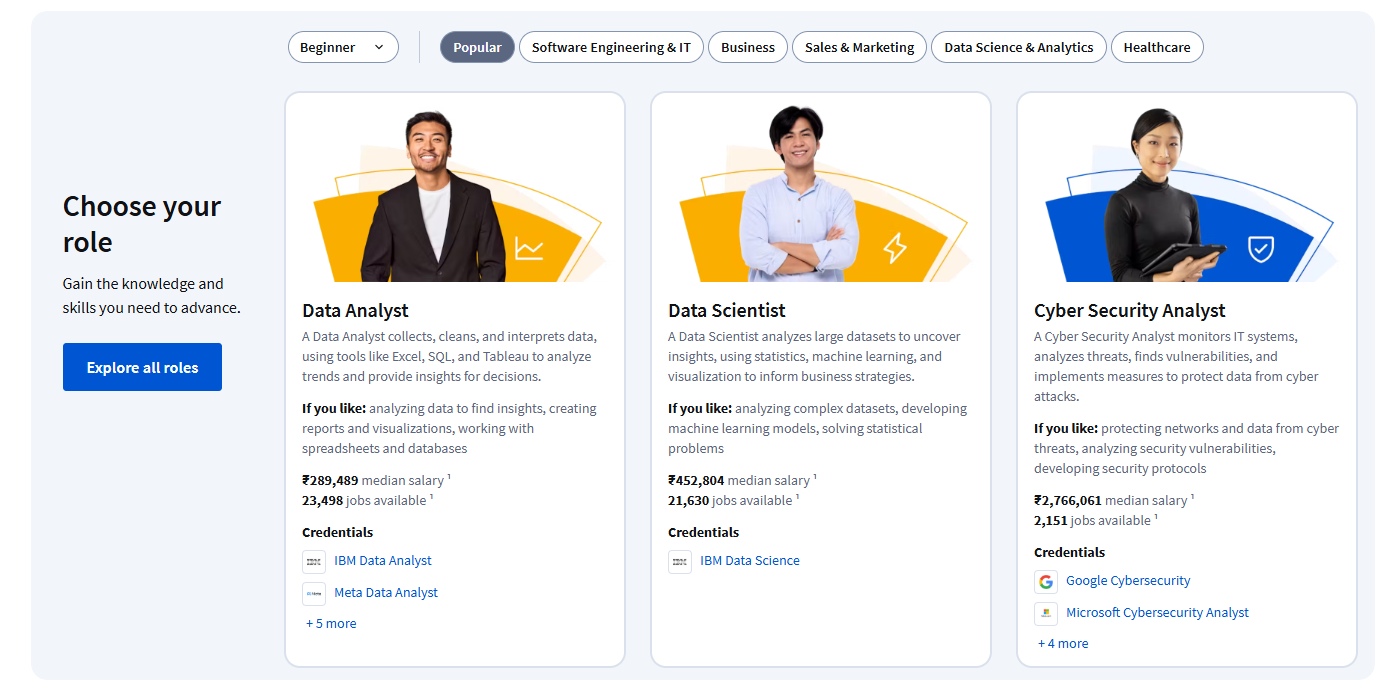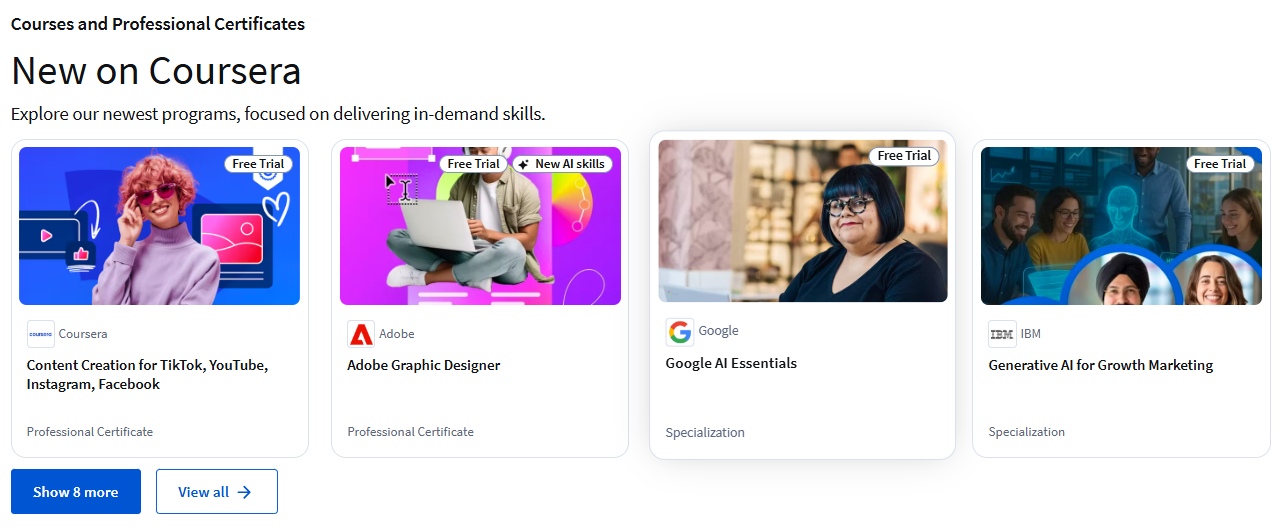Coursera
Hey there! If you’re thinking about diving into online learning, you’ve probably heard of Coursera. It’s one of the biggest names in the e-learning world, promising top-notch courses from prestigious universities and industry giants. But is it really as good as it sounds? I’ve scoured the web, read user reviews, and dug into the platform’s offerings to bring you an in-depth, honest review of Coursera in 2025. Let’s break it down together—pros, cons, pricing, and all—so you can decide if it’s the right fit for you.
What Is Coursera?

The Good Stuff: Why Coursera Shines
1. Top-Notch Content from Prestigious Partners
One of Coursera’s biggest strengths is its partnerships with world-class institutions. You’re not just learning from random instructors; you’re getting content from professors at places like Princeton, Johns Hopkins, and Imperial College London. Plus, industry leaders like Google and IBM offer professional certificates that are tailored to real-world job skills.
I found that users consistently praise the quality of Coursera’s courses. For example, a review on TrustRadius noted, “Coursera offers courses from the professors of the world’s best universities,” and many learners feel the content is rigorous and well-structured. Whether it’s data science, machine learning, or even creative writing, the courses are designed to be in-depth and practical.
2. Flexible Learning Options
Coursera is all about fitting into your life. Most courses are self-paced, so you can watch lectures, complete assignments, and take quizzes whenever it suits you. Deadlines are usually flexible, and if you miss one, you can often reset it without penalty. This is a lifesaver for busy professionals or students juggling multiple responsibilities.
The platform also offers a mix of learning formats: video lectures, quizzes, peer-reviewed assignments, and hands-on projects. For example, specializations often end with a capstone project where you apply what you’ve learned to a real-world problem. This blend of theory and practice makes learning engaging and relevant.
3. Free Courses and Financial Aid
Here’s a big win: Coursera offers tons of free courses. You can audit many courses for free, accessing video lectures, readings, and discussion forums without spending a dime. If you want a certificate or access to graded assignments, you’ll need to pay, but the free option is perfect for curious learners on a budget.
Coursera also has a financial aid program. If you can’t afford a course, you can apply for aid, and if approved, you get full access to course materials and a certificate at no cost. This commitment to accessibility aligns with Coursera’s mission to make education available to all.
4. Recognized Credentials
Coursera’s certificates are a big draw for career-focused learners. Professional certificates, like the Google Data Analytics or IBM Full-Stack Developer programs, are designed to get you job-ready. These credentials are often recognized by employers, and many learners report landing jobs or promotions after completing them. For instance, a user on Upskillwise shared, “I took the Google Data Analytics Professional Certificate, and it was a game-changer! The hands-on projects helped me land my first job in data analysis.”
On top of that, Coursera offers accredited bachelor’s and master’s degrees at a fraction of the cost of traditional programs. For example, you can earn a Master of Computer Science from the University of Illinois entirely online. These degrees are legit, verified, and respected by employers.
5. Coursera Plus: A Great Deal for Serial Learners
If you’re planning to take multiple courses, Coursera Plus is worth a look. For $399 a year, you get unlimited access to over 10,000 courses, specializations, and professional certificates. It’s a flat fee, so you can explore as many topics as you want without worrying about individual course costs. Users love this option for its value, with one reviewer saying, “Coursera Plus was a great deal for me—I took multiple courses for one price.”
6. Multilingual and Global Reach
Coursera breaks down language barriers by offering courses in multiple languages, including Spanish, French, Chinese, and more. Many English courses also come with subtitles in various languages, making them accessible to non-native speakers. With learners in over 29 countries, Coursera truly feels like a global classroom.

The Not-So-Great Stuff: Where Coursera Falls Short
No platform is perfect, and Coursera has its share of drawbacks. Here’s what I found based on user feedback and my analysis.
1. Confusing Pricing Structure
One of the biggest complaints about Coursera is its pricing. It’s not always clear what you’re paying for, and the structure can feel complicated. Individual courses typically cost $29–$99, specializations and professional certificates start at $39.99/month, and degrees can range from $6,000 to much higher. Then there’s Coursera Plus at $399/year, but it doesn’t include degrees or graduate certificates.
Users on Trustpilot have vented about this. One wrote, “Very complicated pricing structure and no clear and comprehensive refund policy. I got charged £36 for a single course after forgetting to cancel the free trial.” Another user complained about a 180-day deadline to complete a course, which wasn’t clearly communicated upfront. If you’re not careful, you might end up paying more than you expected.
2. Inconsistent Course Quality
While most Coursera courses are high-quality, some fall short. A few users noted that certain courses feel outdated or lack depth. Since Coursera hosts thousands of courses, quality can vary depending on the instructor or institution. One reviewer advised, “Always read reviews before enrollment to avoid outdated courses.”
Peer-reviewed assignments, a staple of many courses, also get mixed feedback. Some learners find them valuable, while others say they’re glitchy or don’t provide meaningful feedback. It’s hit or miss.
3. Customer Support Issues
Customer support is another sore spot. Several users reported slow or unhelpful responses from Coursera’s team. One Trustpilot reviewer shared, “I purchased the annual subscription, but the purchase doesn’t show on my page. When trying to contact the company, I only get to talk to robots, no human in sight.” This can be frustrating, especially if you’re dealing with payment or access issues.
4. Time Limits and Deadlines
While Coursera’s flexibility is a plus, some courses have strict deadlines that don’t suit everyone. For paid courses, you typically have 180 days to complete them and earn a certificate. Degree programs have harder deadlines with late penalties. A user on TrustRadius noted, “Time limit on courses increases the pressure on students to complete the course on time.” If you’re a busy learner, this can feel restrictive.
5. Not Ideal for Casual or Creative Learning
Coursera excels at structured, academic, and career-focused courses, but it’s not the best for casual or creative learning. If you want to learn painting, cooking, or other hands-on skills, platforms like Skillshare or MasterClass might be a better fit. Coursera’s courses are often formal, with a university-like vibe, which isn’t everyone’s cup of tea.
How Coursera Compares to Alternatives
To give you a clearer picture, let’s see how Coursera stacks up against other popular e-learning platforms:
- Udemy: Udemy has a larger course catalog (over 200,000 courses) and often lower prices, but its courses are less structured, and anyone can be an instructor. Coursera’s university-backed courses and accredited degrees give it an edge for career-focused learners.
- edX: Like Coursera, edX partners with top universities and offers free course audits. However, Coursera has a broader range of subjects and more flexible pricing options, like Coursera Plus.
- Skillshare: Skillshare is great for creative skills like design or photography, with a subscription model ($168/year). Coursera’s focus is more academic and professional, making it less suited for hobbyists.
- LinkedIn Learning: LinkedIn Learning is career-oriented but has fewer courses than Coursera. Coursera’s degree programs and university partnerships give it a wider scope.
- DataCamp: DataCamp specializes in data science and coding, with interactive, project-based learning. Coursera covers a broader range of topics, making it more versatile.
Coursera stands out for its academic rigor, prestigious partnerships, and accredited credentials, but it’s not the cheapest or most user-friendly option for everyone.
Pricing Breakdown: What You’ll Pay

Coursera’s pricing can be a bit of a maze, so here’s a quick breakdown based on 2025 data:
- Free Courses: Audit courses for free to access lectures and readings. No certificate included.
- Individual Courses: $29–$99 for full access, including graded assignments and a certificate.
- Specializations/Professional Certificates: $39.99+/month, typically taking 1–12 months to complete.
- Coursera Plus: $399/year for unlimited access to 10,000+ courses, excluding degrees.
- Degrees: Start at $6,000 and go up, depending on the program (e.g., bachelor’s or master’s).
- MasterTrack Certificates: $2,000+ for short, graduate-level programs.
You can try Coursera Plus with a 7-day free trial, but be sure to cancel if it’s not for you to avoid charges. Financial aid is available for many courses, which is a big plus for affordability.
Who Is Coursera For?
Coursera is a fantastic choice if you’re:
- A professional looking to upskill or switch careers (e.g., data science, IT, business).
- A student wanting affordable, accredited degrees or certificates.
- Someone who loves structured, university-level learning.
- A global learner needing multilingual courses or subtitles.
It’s less ideal if you’re:
- Looking for casual, creative, or hands-on courses.
- On a tight budget and unwilling to navigate financial aid.
- Frustrated by complex pricing or strict deadlines.
Real User Experiences
To get a sense of what learners think, I checked out reviews on platforms like Trustpilot, Quora, and X. The sentiment is mostly positive, with users praising the platform’s quality and flexibility. One X user shared, “I’ve taken a few free courses through Coursera and love how it’s given me structure and taught me things outside of my current discipline.” Another user raved about the Google Data Analytics certificate, saying it helped them land a job.
On the flip side, some users are frustrated with the platform’s user interface and customer support. An X post complained, “Coursera lacks basic functions & is a pain in the ass to use. My biggest gripe is that there’s no option to save a course to favorites.” Others mentioned issues with pricing transparency and course deadlines.
My Verdict: Is Coursera Worth It in 2025?
After digging through reviews, analyzing features, and comparing Coursera to its competitors, here’s my take: Coursera is absolutely worth it for the right learner. Its partnerships with top universities and companies, combined with a massive course catalog and accredited credentials, make it a standout in the e-learning space. The flexibility of self-paced learning, free course audits, and financial aid options add to its appeal, especially for career-driven individuals or those seeking affordable degrees.
However, it’s not perfect. The confusing pricing structure, occasional course quality issues, and lackluster customer support can be dealbreakers for some. If you’re a casual learner or prefer creative skills, you might find platforms like Skillshare or Udemy more suitable.
Tips for Getting the Most Out of Coursera
- Read Reviews: Check course ratings and reviews before enrolling to avoid outdated or low-quality content.
- Try Free Audits: Start with free course audits to test the waters before committing financially.
- Apply for Financial Aid: If costs are a barrier, take advantage of Coursera’s financial aid program.
- Consider Coursera Plus: If you plan to take multiple courses, the $399/year subscription can save you money.
- Check Deadlines: Be aware of the 180-day limit for paid courses and plan your schedule accordingly.
Final Thoughts
Coursera is a game-changer for millions of learners worldwide, offering a gateway to high-quality education that’s flexible and (often) affordable. It’s not without its flaws, but the pros outweigh the cons for those who want structured, career-focused learning from the best in the business. Whether you’re aiming to boost your resume, earn a degree, or just learn something new, Coursera has the tools to help you succeed—just be ready to navigate its quirks.
So, what do you think? Ready to give Coursera a try? Let me know in the comments if you’ve taken a course or have questions—I’d love to hear your thoughts!
this site is not affiliated with any of brand mentioned. We may earn a commission.